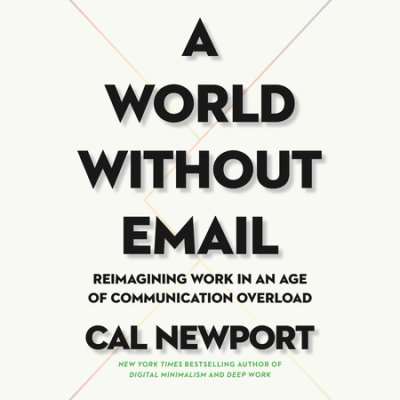Surely many if not most of us have some amount of email fatigue, but who would want a world without it entirely? But the provocative title has this subtitle: “Reimagining work in an age of communication overload.” This book is not about a world without email, but rather ponders an information workforce that doesn’t accidentally rely upon email for coordinating most effort. The central thesis is that knowledge workers let email — and more recently, Slack — happen to us and that the optimal application of electronic communication is very likely not so unstructured. While Newport’s ruminations on successor technologies are not fleshed out enough to form a true proposal, his case studies and arguments are I think worthwhile for beginning a paradigm shift toward how we think about knowledge work this century.

Seemingly for the sake of completeness (since everyone already knows it), Newport first argues about why email sucks. He has three main complaints:
- email reduces productivity
- email makes us miserable
- email has changed workflows to accommodate it
He cites a lot of case studies, anecdotes, and the histories of other major technical innovations to justify these complaints, but the few basic reasons that stuck out to me to motivate them were these:
- we often fail to express important context (or content) that’s frequently non-linguistic
- we’re overconfident that readers will understand our intent
- the friction to sending an email is too low
The first two are really just criticisms of any writing form but are particularly salient in a business context. That last point is really the interesting one that says something about human social dynamics: the idea is that you wouldn’t randomize someone with a stupid question in person, and probably not even if you had a post a physical telegram through an elaborate series of pneumatic tubes. Since email has made interrupting someone virtually free, we wind up abusing the privilege.
What has that abuse led to? Newport calls it the “hyperactive hive mind,” the current state of the art where knowledge work is carried out by ad hoc committee in long email threads. Not only is it obnoxious — inducing people to “work” all the time and encouraging unnecessary, performative messaging — but it’s not efficient either. The cheap and unstructured format of email encourages all manner of productivity-killing behaviors, from always-on burnout to dropped balls from meandering discussions with no clear responsibility delegation to the confusion of email with meaningful work itself.
What’s the solution for knowledge workers? Again proposed through lots of case studies and anecdotes, especially from the industrial revolution, it’s essentially the adoption of purpose-built organization workflows (usually in software) that impose structure and minimize the need to interrupt in order to function. Newport offers three properties of “effective production processes:”
- It’s easy to review who is working on what and how it’s going.
- Work can unfold without significant amounts of unscheduled communication.
- There’s a known procedure for updating work assignments as the process progresses.
Ultimately, Newport concludes that the ease and flexibility of email make it useful for handling truly emergent or novel circumstances, but for everything else in knowledge work there must be a better arrangement than the “hyperactive hive mind.” As an “academic, not a business expert,” Newport leaves figuring out just what that is as an exercise for the reader.
2021, 296 pages.